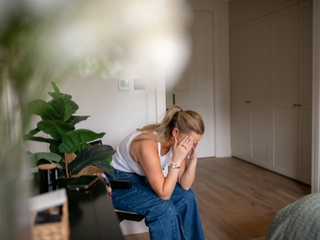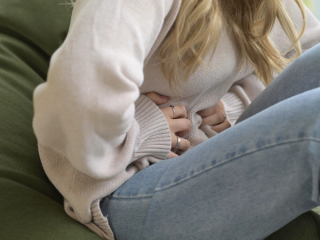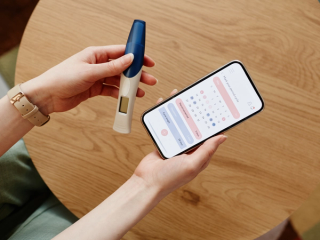
- Home
- Advice Hub
- Conception
- Fertility & Infertility
- Endometriosis And Fertility: What You Need To Know
Endometriosis and Fertility: What You Need to Know
Learn about endometriosis and fertility, including symptoms, causes, and treatment options to help maximise your chances of conception.
What is Endometriosis?
What are the Symptoms of Endometriosis?
Causes of Endometriosis
Does Endometriosis Impact Fertility?
Seeking Guidance and Support for Endometriosis
Exploring Fertility Options for Those with Endometriosis
Ways to Maximise Your Fertility Potential with Endometriosis
FAQs on Endometriosis and Fertility
Endometriosis is a condition that affects 10% of women, and those assigned female at birth, globally. In the UK there are 1.5 million people living with endometriosis and for many this will also have implications for their fertility.
Understanding the relationship between endometriosis and fertility is crucial for those navigating this condition while trying to conceive. This guide explores endometriosis, its symptoms, potential causes, and its impact on fertility, alongside actionable advice to help you to maximise your fertility potential.
What is Endometriosis?
Endometriosis is a chronic medical condition in which tissue, similar to the lining of the uterus, grows outside the uterine cavity. This misplaced tissue can cause inflammation, pain, and the formation of scar tissue.
Endometriosis is commonly found in the pelvis and may also be found on the ovaries, bowel or bladder. Less commonly, endometriosis can also be found outside the pelvis, such as in the chest.
What are the Symptoms of Endometriosis?
The symptoms of endometriosis vary from person to person, with some having minor symptoms or none at all, and others suffering from severe symptoms which can become debilitating. Common signs include:
- Pelvic pain, often linked to menstrual cycles but may also be unrelated
- Painful periods that impact on everyday activities like work and socialising
- Pain in the chest, back or legs
- Pain during or after intercourse
- Heavy or irregular menstrual bleeding
- Fatigue
- Pain when opening bowels or passing urine
- Digestive issues like bloating or constipation
- Difficulty conceiving
- Depression
According to Endometriosis UK, symptoms may differ in severity and do not always correlate with the extent of the condition.
Causes of Endometriosis
The exact cause of endometriosis remains unclear, but researchers suggest multiple factors, including:
- Retrograde menstruation: A process where menstrual blood flows back through the fallopian tubes into the pelvic cavity.
- Genetics: A family history of endometriosis may increase the likelihood of developing the condition.
- Environmental factors: Exposure to toxins may disrupt hormonal balance and immune function.
- Immune system dysfunction: An impaired immune response may fail to eliminate endometrial-like tissue outside the uterus.
- Metaplasia: the process where one type of cell changes or morphs into a different kind of cell.
- Lymphatic or circulatory spread of tissues: tissues travel around the body through the lymphatic system or bloodstream.
In the UK there is currently extensive research underway to understand the causes of endometriosis and find effective treatment options.
Does Endometriosis Impact Fertility?
Endometriosis can impact on the fertility of some people. While endometriosis does not necessarily cause infertility, there is an association with fertility problems. Sadly, lack of research to date means that the link between endometriosis and fertility is not fully established.
However, we do know that the condition may cause:
- Scarring and adhesions within the pelvis that may distort reproductive organs
- Inflammation that may affect egg quality and implantation
Endometriosis and Fertility Rates
Studies suggest that up to 70% of individuals with endometriosis will be able to conceive naturally, which is very reassuring. However, it may take a little longer than in an individual without endometriosis. Severe cases of endometriosis may require medical interventions.
Can You Have Endometriosis and Still Be Fertile?
Many people with endometriosis conceive without significant challenges, particularly when the condition is mild. Fertility outcomes also depend on other factors such as age and overall health, as well as the severity of endometriosis.
Seeking Guidance and Support for Endometriosis
It can be hard to manage endometriosis symptoms, and you might not know who to turn to and where to seek help. However, getting support for endometriosis is crucial in helping you to get a diagnosis and manage your condition. Take the opportunity to explain your symptoms to your doctor. This might feel difficult to do and it is not uncommon for women to experience medical gaslighting and be told that heavy and painful periods are normal. They are far from normal, and you have a right to be listened to and for further investigations to take place.
You might find it helpful to keep a diary of your symptoms, over a menstrual cycle, and share this with your doctor. In the UK you can ask your doctor to refer you to one of the accredited endometriosis centres to get the diagnosis and help you need.
If you suspect endometriosis is affecting your fertility, consult a healthcare provider for a referral to fertility. Early diagnosis and management are essential. Resources like Endometriosis UK and Fertility Network UK offer support and information.
Exploring Fertility Options for Those with Endometriosis
If you are struggling to conceive with endometriosis, it’s important to get the fertility support you need as soon as you can. A fertility specialist can evaluate the severity of endometriosis and recommend tailored treatments. Options may include:
- Medications: Hormonal therapies to manage symptoms.
- Surgery: Procedures to remove endometrial growths and improve reproductive organ function.
- Assisted Reproductive Technologies (ART): Treatments like in-vitro fertilization (IVF) may be effective in severe cases.
Ways to Maximise Your Fertility Potential with Endometriosis
Taking proactive steps can support fertility efforts. Here are some lifestyle changes you might like to make to help manage your endometriosis and optimise your fertility:
Focus on diet
A balanced diet may reduce inflammation and support hormonal health. Whilst there is no recognised best diet for endometriosis and fertility, as more research is needed to fully understand the impact that diet has on managing endometriosis, having a healthy balanced diet will help to maximise your fertility potential.
Key dietary tips include:
- Incorporating omega-3 fatty acids (found in fish and flaxseeds)
- Reducing processed foods and added sugars
- Eating antioxidant-rich fruits and vegetables
- Keep red meet to once or twice a week
You might like to test what foods/drinks make your symptoms worse and eliminate or reduce them from your diet.
Manage stress
Chronic stress can impact fertility. Practice relaxation techniques such as yoga, meditation, or mindfulness.
Maintain a healthy weight
Maintaining a healthy body weight, where able, may help to enhance your fertility potential.
Exercise when you can
Whilst you may not always feel like it, exercising can make a difference to managing your endometriosis and therefore take advantage of when you can exercise. Remember exercise is good for making both your mind and body feel better.
Listen to your body
Be aware of when you have bad symptoms and try to think about what is different to make your symptoms worse at that time. This might be certain foods, stress, time of the month etc - learn about you and your body as everyone is different.
FAQs on Endometriosis and Fertility
The odds of getting pregnant with endometriosis depend on the severity of the condition. With minor or minimal endometriosis, many women are able to conceive naturally. For those with severe endometriosis, with medical treatment, many individuals achieve successful pregnancies.
Timelines vary widely based on individual circumstances, age and other health conditions, but early diagnosis and intervention improve outcomes.
Endometriosis can impair fertility by causing scarring and inflammation, however there is still so much about endometriosis and fertility that we don’t know yet.
For some, pregnancy temporarily alleviates symptoms due to hormonal changes. However, symptoms may return once you have had your baby.
By understanding the relationship between endometriosis and fertility, seeking appropriate care and making healthy lifestyle changes, individuals can navigate their fertility journey with endometriosis with greater confidence. For further guidance, explore resources like the Fertility Network UK and consult with your doctor to create a personalised endometriosis and fertility plan.












